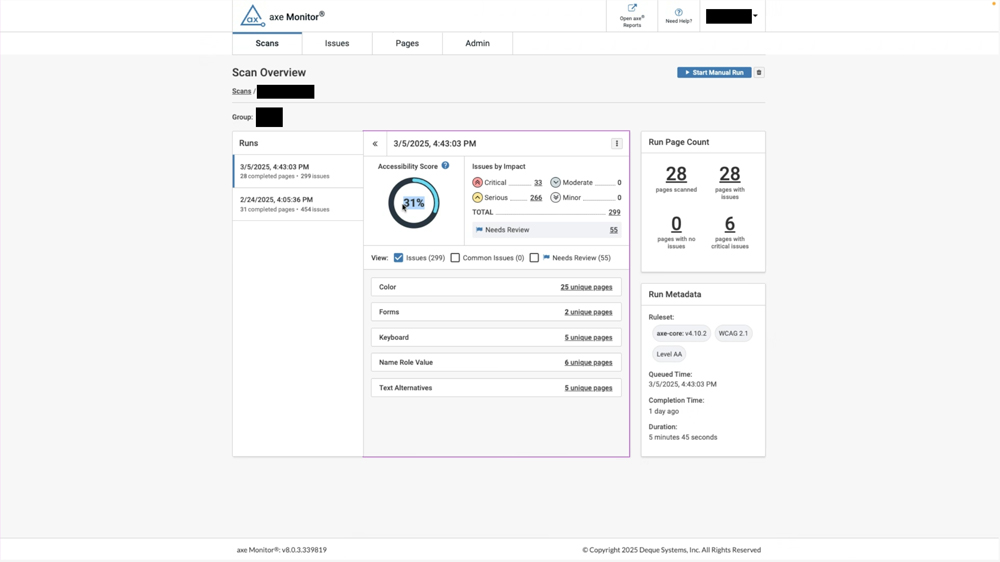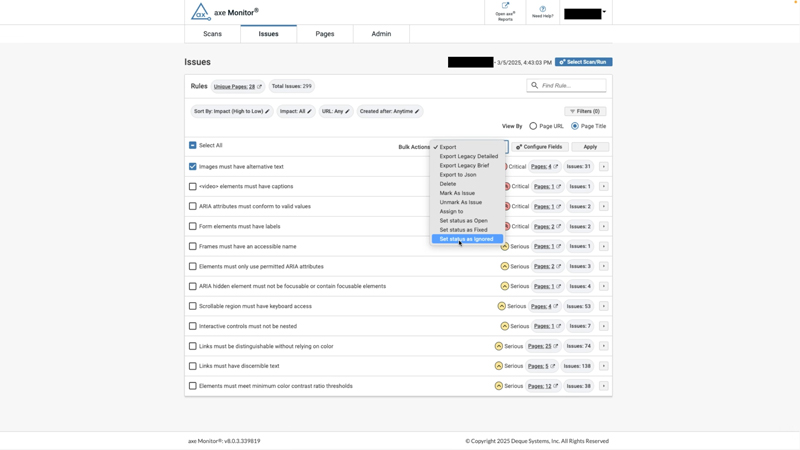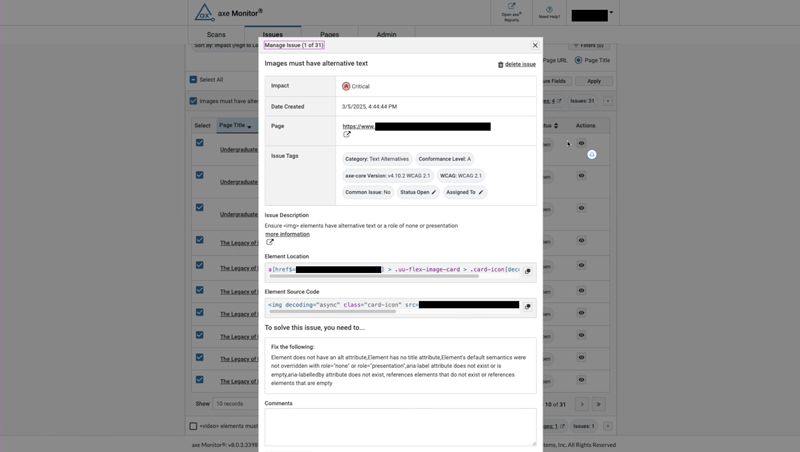UIT, UMC purchase Deque digital accessibility tools

Axe Monitor shows an overview of the digital accessibility of a University of Utah website. Metrics include accessibility score, number of issues, types of issues, number of pages scanned, number of pages with issues, and number of pages with critical issues.
With an April 24, 2026, deadline to meet updated requirements to Title II of the Americans with Disabilities Act (ADA) and more than a million University of Utah webpages to review and bring into compliance, UIT and University Marketing & Communications have purchased Deque Systems digital accessibility tools to help scan, monitor, and test websites and train webmasters.
Barb Iannucci, director for Web Support & Usability in UIT University Support Services, who has long advocated for digital accessibility auditing and reporting tools, helped select the following Deque products:
- axe DevTools Pro: Web and mobile toolkits that test code for accessibility issues
- axe Monitor: A tool that scans, monitors, and reports on a website’s accessibility
- Deque University: Digital accessibility courses and on-demand reference materials
Paid licenses are available for axe DevTools Pro, and a limited number of free licenses are available for Deque University. Organizations will have free access to dashboards for their websites in axe Monitor.
Iannucci said most webmasters don’t need axe DevTools Pro for basic web management. It’s better suited for web and mobile developers who need more sophisticated testing as they build websites and templates from code.
“When you use automated testing, it detects only about 57% of accessibility issues, according to Deque. You have to manually test to find the remaining issues,” she said. “With Axe DevTools Pro, intelligent guided tests uncover about 80% of accessibility issues, according to Deque, which will save us a lot of time when developing code.”
Iannucci said she is most excited about axe Monitor, which scans websites, identifies accessibility issues, and suggests solutions.
“Our licensing allows us to have unlimited scans and add unlimited users to dashboards. Many of the tools we reviewed base their pricing on how many pages are scanned, and the university has millions,” she said. “Deque also provides a lot of cool reporting capabilities, where we can use different dimensions to get fine-grained data.”
Information available in axe Monitor dashboards includes accessibility score, number of issues, issue by impact (critical, serious, moderate, or minor), issue category (e.g., color, forms, keyboard, text alternatives), issue status (open, fixed, ignored), issue description, element location and source code, solution, and comments.

Under the "Issues" tab in axe Monitor, users can select issues and take bulk actions like export, delete, mark as issue, set status as ignore, and more. Select the image for a larger version.

Under the "Issues" tab in axe Monitor, users can review an issue to get more information. In this instance, axe Monitor identified an image that did not have alternative text, marked it as a critical issue, noted the page where it's located, and suggested a solution. Select the image for a larger version.
Request access or licenses
To request access to or a license for a Deque tool, please visit this UMC webpage.
Axe DevTools Pro licenses
- Five seats (minimum) — $450.00 per seat annually
- Twenty or more seats — $425.00 per seat annually
Although the tools are powerful, remediation will largely fall to webmasters.
“The tools don't fix accessibility issues automatically; they identify the issues, indicate where they are, and give you advice on how to fix them,” Iannucci said.
Sravi Garikipati, associate director for UMC Digital Research & Operations, said UMC is remediating WordPress websites based on visibility and priority, following its digital accessibility roadmap. “Our team is assessing each site and rolling out additional training and axe Monitor permissions to corresponding groups.”
Iannucci said UIT will roll out monitoring for Modern Campus CMS sites and provide webmasters access to their dashboards. Then UIT will launch monitoring for the rest of the sites in the Website Registry. Additionally, the bimonthly University Webmasters Forum will continue to cover digital accessibility topics to help webmasters prepare for and work through issues.
The groups recently finished system training, as well as setting up preliminary scans and single sign-on so they can add users. Next, they’ll discuss how they want to proceed with the information they’ve collected.
Iannucci said the university is moving forward with the digital accessibility tools and updates regardless of what’s happening with the U.S. federal government.
“The Department of Justice will probably not proactively enforce Title II, but private litigation is still very much a thing, and private lawsuits continue to increase. And until now, most courts have sided with the complainants,” she said. “The university wants not only to avoid legal action but make its websites and apps as accessible as possible because it’s the right thing to do.”
Node 4
Our monthly newsletter includes news from UIT and other campus/ University of Utah Health IT organizations, features about UIT employees, IT governance news, and various announcements and updates.
